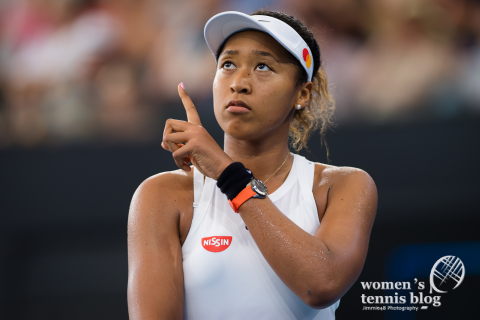The mental side has a big influence on tennis results. When we look at the top level, we can see that many players have the same technical or physical abilities, but only a few of them are able to constantly win matches. Does it happen only on the ATP and WTA tours? Not really. At all levels of play, having strong mental skills is a great advantage, so all players should strive to learn about them and do the work to possess them.
Coach Marcin Bieniek, founder of instructional Enjoy Tennis Blog, emphasizes the importance of the mental aspect in tennis and explains how to work on it.

There is no doubt that lack of emotional control can make even advanced players lose the match. It doesn’t matter if you know how to play forehand or you can run for two straight hours, because if you let your emotions play the vital role on the court, you will never achieve desired results. The mind decides about your actions, so mental training has to be included in your weekly schedule to guarantee visible improvement and good results.
Watching matches during tournaments is a great opportunity to discover different aspects that every player can improve in their performance. From technical aspects to mental abilities, if we pay attention to details, we can get valuable information for our next practice session. One of the areas that many players struggle with is emotional control. They are able to play really well and suddenly, after one easy mistake, their performance drops significantly, so they lose five or six games in a row. It is not related to losing technical or tactical skills — the reason slumps happen is the fact that the player’s mind is controlled by emotions.
 Every player is different and so are their emotional reactions. However, all players should work on emotional control to make sure that their reactions won’t be responsible for losing crucial points. Sometimes one or two points in the match decide the winner, so players shouldn’t allow their emotions to take the lead. Players have to understand that they can control emotions, but they have to do it consciously, using specific techniques available.
Every player is different and so are their emotional reactions. However, all players should work on emotional control to make sure that their reactions won’t be responsible for losing crucial points. Sometimes one or two points in the match decide the winner, so players shouldn’t allow their emotions to take the lead. Players have to understand that they can control emotions, but they have to do it consciously, using specific techniques available.
1. Be aware of your emotional side
It is impossible to work on something that we are not aware of. To play well, you have to make sure you understand when you make wrong tactical decisions and also when the negative emotions happen. Every time you get angry, frustrated or demotivated, you have to know that it is the moment to apply specific knowledge.
2. Use available time
One of the biggest mistakes that players do while not controlling emotions is hurrying up. The process is quite simple — they make a mistake, get angry and immediately go to the baseline to play another point. If you want to effectively control your emotions and play your best tennis, you have to use available time between the points and games to let your mind achieve proper state.
 3. Breathe slowly
3. Breathe slowly
One of the best methods to keep emotions under control is breathing. Breathing is a natural process necessary to live, but athletes don’t always use the most effective way of breathing. When getting angry or stressed, human body tends to shallow the breath and make it really quick. That doesn’t help to get rid of emotions. To calm down and stay more relaxed, players should apply a slow breathing technique to regulate the tempo of inhaling and exhaling the air and get back the control over their mind and body.
4. Practice emotional control regularly
You can’t have a great serve if you practice it once a week. The same approach works for emotional control. Every situation in our life creates our response and many times it is based on emotions. That is why being consistent with conscious practice both on and off the court is the best way to achieve visible results. The more times you stop the negative influence emotions try to have on your body, the more times will you be able to play your best game while having a match point or facing a break point in the final of a tournament.
Tennis is definitely among sports where the mental aspect is a crucial characteristic of champions. Still, not too many players know and want to improve emotional control using specific techniques. It is important to understand that without solid mental skills even the best forehand won’t be working as expected. Players who can control what is going on in their heads will also be able to control what is going on during the match.
Visit our Tennis Tips page for a lot more articles by tennis coaches. There you can learn how to improve specific shots and skills, handle pressure, adapt your game to all surfaces and weather conditions, choose the best tennis racquet, and much more.







